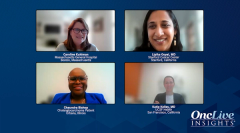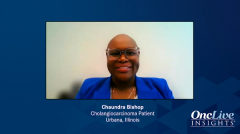
Next-Gen Inhibitors Shaping Cholangiocarcinoma Treatment Landscape
Next-generation FGFR inhibitors show promise in early trials evaluating their efficacy and safety for the treatment of cholangiocarcinoma.
Episodes in this series

This page is funded by Taiho Oncology, Inc. The faculty and publisher are solely responsible for this content. Taiho does not recommend or endorse the use of its products other than as described in the approved labeling. The content of this page is not medical advice and does not replace independent medical judgment.
This is a video synopsis/summary of a OncLive Insights involving Lipika Goyal, MD; Chaundra Bishop; R. Katie Kelley, MD; and Caroline Kuhlman, NP.
Kelley discussed next-generation FGFR2 inhibitors in development after the recent pemigatinib and futibatinib approvals. One drug further along is RLY-4008, a highly selective FGFR2 inhibitor without much FGFR1/4 inhibition. This may reduce hyperphosphatemia adverse effects seen with less selective drugs. Early data showed striking efficacy in chemotherapy-refractory, FGFR inhibitor–naive cholangiocarcinoma, with 88% response rates. A 100-plus-patient pivotal trial has completed enrollment.
For patients progressing after initial FGFR blockade, acquired kinase domain mutations confer resistance. Kelley mentioned 2 trials of such drugs, one for KIN-3248 and another for a next-generation inhibitor called TYRA-200.
Goyal added tinengotinib, a multikinase FGFR1-3 inhibitor, now in a phase 3 trial randomizing prior FGFR-treated patients to tinengotinib or physician’s choice chemotherapy. Encouraging phase 1 data shows tinengotinib activity despite prior FGFR treatment.
In summary, futibatinib appears highly active in the FGFR inhibitor–naive setting but acquired resistance limits duration of response to initial FGFR blockade. However, next-generation inhibitors better countering common resistance mutations offer promise in overcoming this limitation. More approvals could expand future treatment options for cholangiocarcinoma patients with FGFR alterations.
Video synopsis is AI-generated and reviewed by OncLive® editorial staff.





































